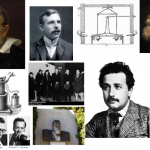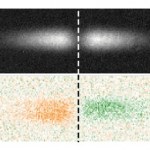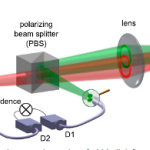Experiment
The most talked-about physics paper last week was probably Negative Absolute Temperature for Motional Degrees of Freedom (that link goes to the paywalled journal; there's also a free arxiv preprint from which the above figure is taken). It's a catchy but easily misinterpreted title-- Negative absolute temperature! Below Absolute Zero! Thermodynamics is wrong!-- that obscures the more subtle points of what's going on here. So, in the interest of clarity, I'm going to attempt an explanation, over the course of a few posts, but given my schedule these days, that might spread over a couple of…
We're at that time of year where people publish lists of top stories of the year, but as many crazy people will be happy to remind you, this Friday marks the end of another calendrical period, in the Mayan calendar. So, I'm going to steal an idea from a college classmate on Facebook, who wrote:
When I look back on Baktun 13, I'm going to remember all the wonderful things that happened. What's your best memory from the last 144,000 days?
This seems like a good way to get some more cheerful and science-y content on the front page of the blog. So, without further ado (or very much thought),…
In which I unpack a cryptic paper title and explain how quantum superposition lets you use light to keep things from interacting with light.
-------------
I joined AAAS a couple of years ago to get a break on the registration fee for their meeting, and I've kept up the membership mostly because I like having individual access to Science articles, so I can read them in the coffee shops where I get actual work done. This also gives me access to articles in the "advance online publication" stage, which is hilarious because Union's institutional subscription doesn't include those articles-- if I'…
Last week, in the post about fermion conduction, I left a reference hanging:
There’s nothing physically blocking the atoms from flying right through the channel– in fact, an atom that enters the channel will always exit the other side without slowing down along the way. This is termed “ballistic,” a term that will always have a special place in my heart thanks to an incident at my Ph.D. defense.
Which was what? Let’s just leave that hanging to see if anybody actually reads this far. I can explain it in a comment if people want to know.
A couple of people asked for the explanation in comments…
So, it's been a while, but let's see if we can't hit the ground running with a good physics post. There have been a few notable physics events since I went on hiatus, but for a return to physics ResearchBlogging, we'll go with something near and dear to my heart, ultracold atoms. Specifically, this Science paper (free arxiv version) about passing atoms through a narrow channel. This is a cool bit of subfield-crossing physics, so let's dust off the Q&A format, and go through it.
Hey, dude, long time no see. So, what's the deal with this paper? Well, the title pretty much tells you what's…
In which celebrity culture comes to particle physics.
------------
It's been about six months since we had a big flurry of Higgs Boson stories, and as enjoyable as the relative quiet has been, it means we're due for another run. And, predictably enough, the usual suspects are stoking speculation about what, exactly, will be officially revealed in a few weeks at the summer particle physics meetings. This spilled over into the rest of the social media universe, with the joke hashtag #HiggsRumors becoming a trending topic on Twitter for a little while last night.
As is also sadly predictable,…
In which we do a little ResearchBlogging, taking a look at a slightly confusing paper putting a new twist on the double-slit experiment.
------------
I'm off to California this afternoon, spending the rest of the week at DAMOP in Pasadena (not presenting this year, just hanging out to see the coolest new stuff in Atomic, Molecular, and Optical Physics). I don't want to leave the blog with just a cute-kid video for the whole week, though, so here's some had-core physics: a new paper in the Proceedings of the National Academy of Sciences (freely available online), looking at a new sort of…
In which I talk about the common complaint that we teach students physics that "isn't true," and the limits on that statement.
------------
Frequent commenter Ron sent me an email pointing to this post by David Reed on "What we “know” that t’aint so…. and insist on teaching to kids!":
he science we teach is pretty old. Mostly 19th century ideas about the world around us are taught as “facts” with little but anecdotal data to support it. We teach it via an ontology that replays the history of science, thus the newest and most powerful scientific understandings are viewed as “too advanced”. If…
Enough slagging of beloved popularizers-- how about some hard-core physics. The second of three extremely cool papers published last week is this Nature Physics paper from the Zeilinger group in Vienna, producers of many awesome papers about quantum mechanics. Ordinarily, this would be a hard paper to write up, becase Nature Physics are utter bastards, but happily, it's freely available on the arxiv, and all comments and figures are based on that version.
You're just obsessed with Zeilinger, aren't you? All right, what have they done this time? The title is "Experimental delayed-choice…
I've been busily working on something new, but I'm beginning to think I've been letting the perfect be the enemy of the good-enough-for-this-stage, so I'm setting it aside for a bit, and trying to get caught up with some of the huge number of things that have been slipping. Which includes getting the oil changed in my car, hence, I'm sitting in B&N killing time, which is a good excuse to do some ResearchBlogging.
Last week was a banner week for my corner of physics, with three really cool experiments published. Two of those are on the arxiv, which means I can use images from the paper (…
So, the infamous OPERA result for neutrino speeds seems to be conclusively disproven, traced to a problem with a timing signal. Matt Strassler has a very nice explanation of the test that shows that the whole thing can almost certainly be traced to a timing error that cropped up in 2008. This problem is generally described as resulting from a "loose fiber optic cable," and Matthew Francis's reaction is fairly typical
The main culprit was a fiber optic cable that was slightly out of alignment. This is not quite a "loose wire", as it sometimes has been described: it's far more subtle and harder…
Richard Feyman famously once said that the double-slit experiment done with electrons contains everything that's "'at the heart of quantum physics." It shows both particle and wave character very clearly: the individual electrons are detected one at a time, like particles, but the result of a huge number of detections clearly traces out an interference pattern, which is unambiguously a wave phenomenon. The experiment has been done lots of times, but a particularly nice realization of it comes from Hitachi's R&D department, where you can see both still images and video of their experiment…
A little more tab clearance, here, this time a few recent stories dealing with those elusive little buggers, neutrinos. In roughly chronological order: /p>
The Daya Bay experiment in China has measured a key parameter for neutrino oscillation (arxiv paper), the phenomenon where neutrinos of one of the three observed types slowly evolve into one of the others. Mathematically, this is described as each of the three types we observe being an admixture of three more fundamental types. This mixing is described in terms of the sine of some "mixing angle," because physicists love geometry, and…
So, the news of the moment in high-energy physics is the latest results being reported from a conference in Europe. The major experimental collaborations are presenting their newest analyses, sifting through terabyte-size haystacks of data looking for the metaphorical needle that is the Higgs boson.
And what are those results? It sort of depends on who you ask. Tommaso Dorigo points at the final data from the Tevatron and claims victory; Matt Strassler thinks the lack of evidence at the LHC is almost as important, though there is progress there in excluding some new regions. The net result is…
It's not a good week for me to be writing about anything remotely controversial, but if I want to keep my physics blogging license, I need to say something about the latest fast neutrino news. This has followed the usual trajectory of such stories, with the bonus farcical element of people who blasted the media for buying into the initial release seizing triumphantly on an initial rumor in the press that was garbled into incomprehensibility. With a little more time, it's become more clear how their result has become less clear, and the best place to look for a description of this is Matt…
Regular reader Johan Larson sends in a good question about academic physics:
You have written about teaching various courses in modern physics, a subject that has a fearsome reputation among students for skull-busting difficulty. That suggests a broader question: what is the most difficult course at your university? Or even more broadly, how would one determine what course is the most difficult?
This is a good question, but hard to give a single answer to. The most difficult course at the college as a whole would be nearly impossible to determine, because different students find different…
It's been a little while since I wrote up what I've been doing in my "Brief History of Timekeeping" class, because I was out of town, and then catching up from being out of town. Some of this material has already appeared here, though, so I can hopefully catch up a lot of stuff in one post.
The material that will be most interesting to random readers of the blog is the "How to" section, from a couple of weeks ago, which were the lecture form of the How to Read a Scientific Paper and How to Present Scientific Data posts here. The paper-reading class was on Monday and the data-presentation…
Over at Backreaction, Bee is running an advent calendar of her own, with amusing anecdotes about famous physicists. Apparently, it's a good year for advent calendars.
A couple of days ago, her story was a famous one about Heisenberg nearly failing to get his Ph.D. because he disdained experiment:
Wien wanted to fail Heisenberg, but Sommerfeld, in whose exam on theoretical physics Heisenberg had excelled, put in a strong word for Heisenberg. Heisenberg passed the doctoral examination with the lowest possible grade
Between this, and my own advent calendar posts about historical physics, I got…
Physics World has released its list of the top ten breakthroughs in physics for the year, and it doesn't include either fast neutrinos or the Higgs boson:
The two physics stories that dominated the news in 2011 were questions rather than solid scientific results, namely "Do neutrinos travel faster than light?" and "Has the Higgs boson been found?". However, there have also been some fantastic bona fide research discoveries over the last 12 months, which made it difficult to decide on the Physics World 2011 Breakthrough of the Year.
But after much debate among the Physics World editorial team…
I was planning to let today's Higgs press conference pass with only a few oblique mentions in posts about other things, but apparently, I would lose my license to blog about physics if I did that. You'd think that, being married to a lawyer, and all, I'd know to read the fine print in these things...
Anyway, I don't really have anything useful to say about it. My very-much-an-outsider reading of this is that the evidence they see is suggestive, but somewhat less impressive than even the many attempts to lower expectations on Twitter and elsewhere suggested. It's probably there, but they're…




